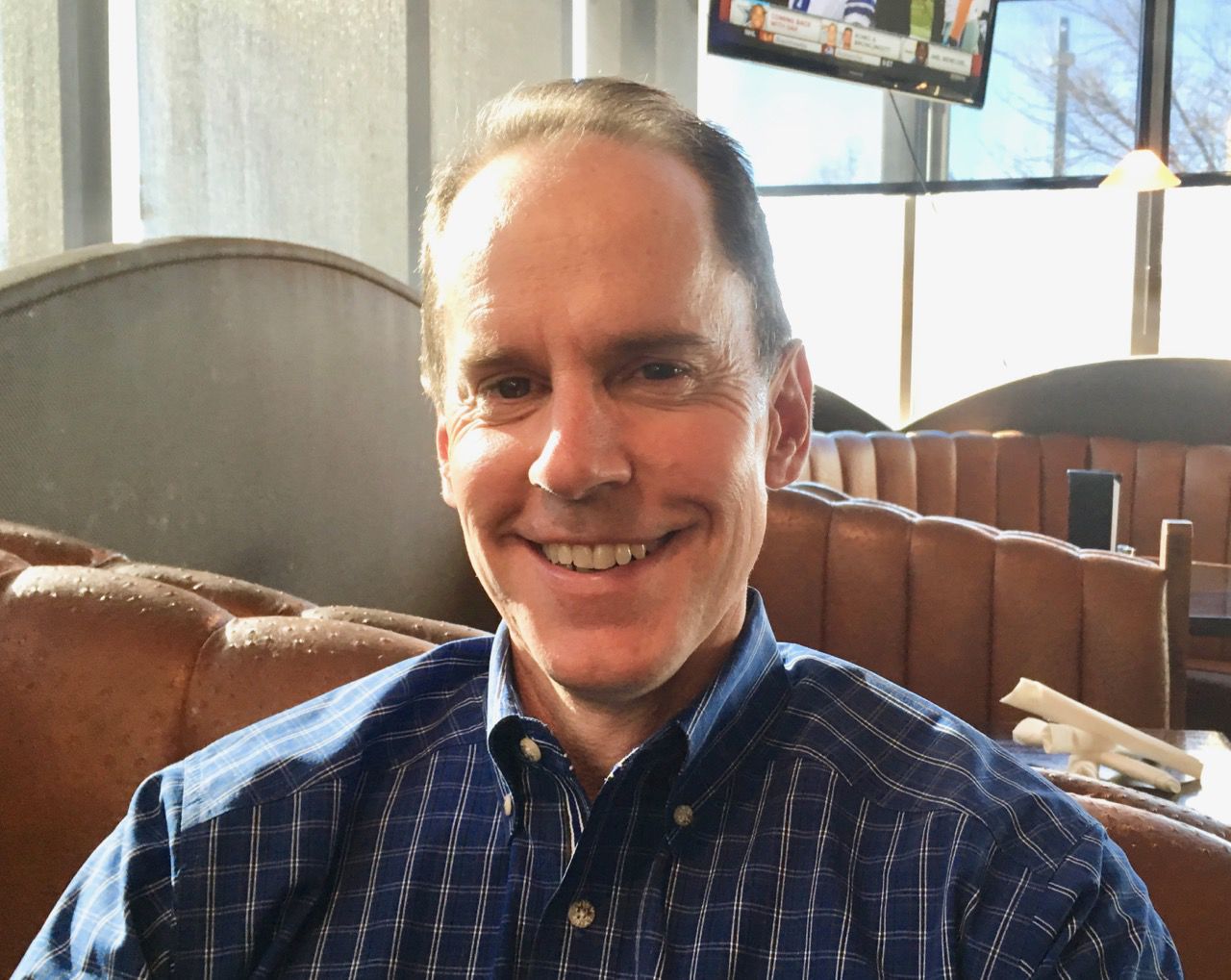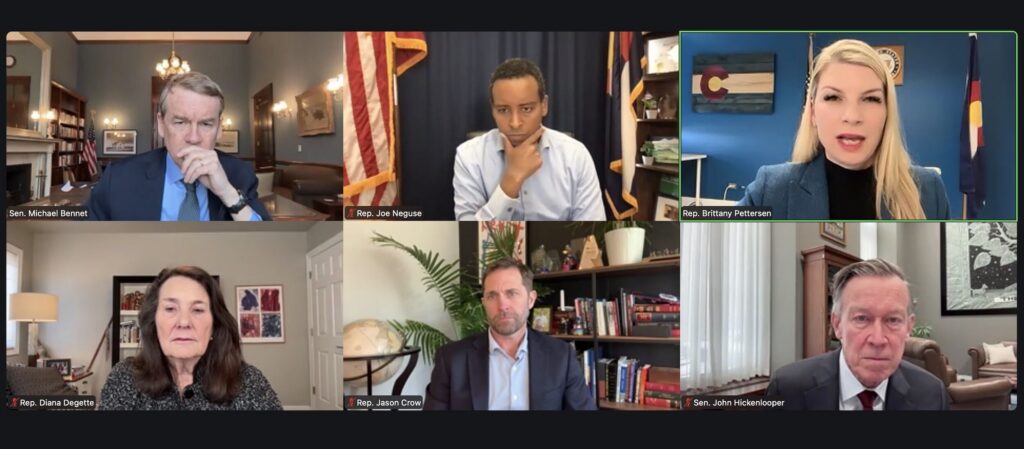Q&A with Mark Hillman: At home at the Capitol or down on the farm

Mark Hillman may be the kind of guy Thomas Jefferson had in mind when he extolled the virtues of America’s “yeoman farmer.” Born in Burlington on the eastern plains, raised on his family’s farm, Hillman early on became a sort of rural Renaissance Man. A plowman-politician who by his 20s had also worked as a local newsman for the Burlington Record, Hillman went on to serve with distinction as a Republican in the Colorado Senate 1998-2005 – rising to majority leader (and putting up with me as one of his staffers for some of that time). He served a stint as state treasurer, too, following a gubernatorial appointment. Equally adept at making public policy and raising winter wheat, he’s comfortable behind the podium, on his tractor or at the keyboard, where he comments on the passing political scene for his blog.
Arguably, he’s that Jeffersonian ideal: a tiller of fields who also serves the public. As Hillman puts it, “… it wasn’t unusual for me to get out to the field by 6 a.m., run a tractor til mid-afternoon, then head to an evening meeting somewhere in the district.”
His legislative days behind him, he still farms and helps wife Heidi raise their two sons in Burlington – yet makes it to the Capitol often enough to advocate for tort reform as executive director of the Colorado Civil Justice League. And not too long ago, he returned to public office, having been elected to his local school board. Why did he jump back into the fray – yet again – and does he have further political ambitious? He answers those questions and more in today’s Q&A.
Colorado Politics: You grew up on your family’s farm and then farmed for your own livelihood – and still do. You brought that perspective to the legislature, as well, addressing agricultural and rural views and interests. Given the vast rural expanses on both sides of that narrow sliver of metropolitan life along the Front Range, do Colorado farmers, ranchers and rural communities have enough representation in the legislature? How does it affect agriculture and rural interests if only a few legislators who know that life firsthand are sitting under the Capitol rotunda in Denver?
Mark Hillman: There was a brief period after Dave Wattenburg retired when I was the only farmer/rancher in the Legislature. That was a big change from the stories of yesteryear when Bev Bledsoe and others made sure that agricultural interests were taken into account in all legislation. Fortunately, Jim Isgar and Greg Brophy were soon elected, and Lew Entz returned to fill a vacancy. But today due to population growth along the Front Range and ski corridor, there are only a dozen truly rural seats where a farmer even has a chance to be elected. And it’s challenging for a farmer to serve unless he or she has adult children at home who are managing the operation. I was in a unique situation because back then my farming operation was busiest from mid-April until late-September, so there was only a little overlap. Plus, I was young and single, so it wasn’t unusual for me to get out to the field by 6 a.m., run a tractor til mid-afternoon, then head to an evening meeting somewhere in the district.
Today, the problem isn’t so much indifference to agriculture and rural life; rather, the problem is lack of understanding of why we do things differently than urban/suburban legislators might expect. We need a “legislator exchange” to let our city cousins come spend a few days on the farm just to experience it for themselves. They’d also learn that living in rural Colorado is a pretty good way of life.
Mark Hillman
CP: You’re among the few who have served as both a majority and a minority leader in the state Senate – so you know what it’s like to dish it out as well as to take it. We know one is a lot less fun than the other; but what else did being in the minority teach you? Any lessons that might have been of help to you when you were in the majority?
Hillman: Being minority leader is a terrible job, particularly when you’ve previously been in the majority. I called the minority leader’s job description, “equally distributing misery.” Everyone should serve in the minority at some point just to understand what it’s like. When I was first elected, Republicans had been in the majority in the Legislature for about 20 consecutive years. I remember asking veteran members questions about rules and procedures, “Yeah, but what if we’re in the minority.” They told me, “Don’t let yourself become the minority.” That’s easier said than done. It’s so important for legislators to build relationships across the aisle and to be willing to stand for what’s right and fair procedurally when they are in the majority. Certainly, there are times when the majority has to carry the day because that’s where the buck stops, but those times are rare. In most cases, legislators who have been treated fairly when in the minority will realize an obligation to do the same when they’re in the majority.
CP: You have at various turns been a rising star, a guiding light and a conservative conscience for your fellow Colorado Republicans. Drawing on that perspective, what do Colorado Republicans need most right now. What kinds of next-gen candidates should they be recruiting and cultivating?
Hillman: There’s a lot of freedom in being a “has been.” Republicans need to remember that our party is bigger than any one person. For the Republican Party to be strong, we must continue to be a party of ideas and principles – not personalities. Even the best people will disappoint us sooner or later. Principles – like personal freedom and limited government – are timeless. And we need to present those principles as the path to opportunity with an optimistic view of the future. You might win one election because your supporters are “mad as hell and not gonna take it any more.” But that’s not a long-term strategy for success.
CP: Most recently, your political life took another turn: You were elected to your local school board in Burlington – the same district where you went to school growing up. Why did you jump back into politics – in an elected post regarded as thankless because of its long hours, complex issues, angry parents, marathon meetings and no pay? Did you miss serving in public office, or was there something about education in particular?
Hillman: I didn’t jump back into politics in any meaningful sense, but I “ran” for school board because I thought I could be helpful to our local school and because my kids were just reaching school age. We have a K-12 school of about 700 students, and two of the past three elections were uncontested. We have a school board that works very well together. Most of us either grew up here or have kids in school, so we know what our parents expected from Burlington School District – sound education and good values – and we generally want the same for our kids. I’m also on the local groundwater management board, so as my dad (who was a Democrat county commissioner) used to say, “I’m a glutton for punishment.”
…(T)he problem isn’t so much indifference to agriculture and rural life; rather, the problem is lack of understanding of why we do things differently than urban/suburban legislators might expect. We need a “legislator exchange” to let our city cousins come spend a few days on the farm just to experience it for themselves.
CP: What’s the best policy adopted in Colorado – whether by lawmakers or voters at the ballot box – in the past 25 years? What’s the worst?
Hillman: Well, keeping in mind that all policy is imperfect, the best policy of the last 30 years is the Taxpayer’s Bill of Rights. Everybody wants to spend other people’s money, but TABOR causes us (voters) to weigh costs and benefits. People have the inherent right to decide how much they want to pay for government, and lawmakers have an obligation to live within those boundaries. The worst policy has been the Legislature’s backdoor attempts to ignore the role that voters are intended to play and instead creating taxes masquerading as fees or “enterprises” that are exempt from TABOR but which have no legitimate enterprise function and merely launder money to evade TABOR limitations.
CP: We of course have to ask you: After your tenure is up on the school board, any plans to run for higher office?
Hillman: I wouldn’t say never again, but I can confidently say, not any time soon. My boys have another 10 years in school, and children truly need both parents to be fully engaged. On the rare occasions when my wife is away and I’m playing “Mr. Mom” for several days, I truly marvel at how obviously parenting is a two-person job. I also greatly admire single parents who find a way to be successful parents.
CP: If you had one thing you could do over in a different way along your political path, what would it be?
Hillman: I can’t think of anything. Making mistakes is part of life, so the important part is to learn from them. When I lost the race for treasurer in 2006, I think people around me were surprised by how quickly I got over it – by about noon the day after the election. Nobody wants to lose, but the worst part of the election is the month or two before election day when you can’t plan your future until you know the results. When you’re in candidate mode, you grow accustomed to planning your life in 2- and 4-year increments. When you get out of that cycle, you look back on it and laugh at how ridiculous that was. Now, when I think about how many things I’d have to give up to go back to being a candidate, it’s not an attractive trade.














